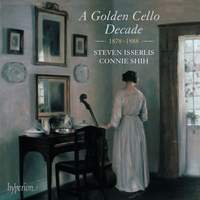Recording of the Week,
Steven Isserlis explores the cello's Golden Decade
The 1880s were indeed a 'golden decade' for the cello; from these ten years come regularly-programmed sonatas by Grieg and Brahms, as well as smaller-scale favourites by Fauré and Saint-Saëns. Steven Isserlis's focus, though, is not these 'hits', but a selection of contemporaneous works that never quite enjoyed the same fame. Sonatas by Richard Strauss and Louise Adolpha Le Beau occupy pride of place, alongside Isserlis's own arrangements of Dvořák's Four Romantic Pieces, originally for violin and piano. The sleeve notes see him insist, twinkle-eyed, that surely Dvořák must have expressed a desire for these to be arranged for cello – the proof must simply be lost in the mists of time…
 The album opens, however, with a bona fide palpable hit – Bruch's ever-popular Kol Nidrei, in a version for cello and piano but retaining the indispensable addition of the harp. Isserlis responds sensitively to the music's paradoxical sense of extroverted melancholy, but the work itself also acts as a jumping-off point for a brief foray into the web of musical connections extending out from it. These take the form of two musical 'footnotes' that provide the album’s other book-end.
The album opens, however, with a bona fide palpable hit – Bruch's ever-popular Kol Nidrei, in a version for cello and piano but retaining the indispensable addition of the harp. Isserlis responds sensitively to the music's paradoxical sense of extroverted melancholy, but the work itself also acts as a jumping-off point for a brief foray into the web of musical connections extending out from it. These take the form of two musical 'footnotes' that provide the album’s other book-end.
The first is a second setting of Kol Nidrei by Ernst David Wagner, which Isserlis admits he included partly in order to make the composer's racist namesake turn in his grave at the idea of 'Wagner: Kol Nidrei' appearing on the score. Wagner's main career as a church organist peeks through in some of his cadential turns of phrase, but it's by no means a four-square hymn-like work. At half the length of Bruch's, it's arguably more concise and concentrated – perhaps trading off rhapsodic invention for intensity. The album then ends with Isserlis's own arrangement of one of Isaac Nathan's Hebrew Melodies - the inspiration for Lord Byron's set of poems of the same name, and seemingly also part of the genesis of Bruch's work.
The two sonatas featured are both competition entries – the great and the good were keenly promoting new compositions, not least for the cello. Neither the fifteen-year-old Richard Strauss's cello sonata nor that of Luise Adolpha Le Beau, in her mid-twenties, in fact won any prizes, but Isserlis makes a convincing case for both. The Strauss is heard in its original version (it would subsequently be heavily revised by the composer later in his teens) and I couldn't help but be reminded of his similarly early Horn Concerto No.1; the ebullient, 'school's-out' feeling of the opening, and the transition into an easy-going lyricism, are exactly the hallmarks of early Strauss that make the concerto so special.
By contrast, the sonata by Le Beau (a pupil of Clara Schumann, among others, though the two women seem to have frequently crossed swords) is best summed up by the word 'richness'. Her writing – sonorous and dramatic from the outset – demands a heroic, big-boned sound, and both Isserlis and pianist Connie Shih deliver. Despite my fondness for early Strauss, for me this is by far the standout work on the album.
In the sleeve notes Isserlis floats the idea of these two sonatas being 'naïve' in places. I don’t think that's wholly fair in either case, but at any rate he doesn't take them lightly in performance – he always commits to the music, and where there's youthful optimism (or, if you prefer, naïveté) he brings it out unapologetically. The Strauss, in particular, captures perfectly a sense of a young composer stepping out; there's no over-done melodrama or melancholic world-weariness here, for all that the cello can excel in such sentiments. It's worlds away from the opening Kol Nidrei or the broad sweeps of the Le Beau. Isserlis's tone in the slow movement is generally on the delicate and self-effacing side, as is Shih's accompaniment, and I'm sure this is at least partly in the service of catching the right mood.
Whatever it was that made the 1880s such an astonishingly fertile moment for cello writing, Isserlis's decision to double down and draw attention to even more works from that decade pays dividends. The original version of the Strauss is a joy, the Kol Nidrei offshoots are fascinating, and the Le Beau is a truly magnificent rediscovery that belongs right at the heart of the repertoire.
Steven Isserlis (cello), Connie Shih (piano), Olivia Jageurs (harp)
Available Formats: CD, MP3, FLAC, Hi-Res FLAC, Hi-Res+ FLAC



